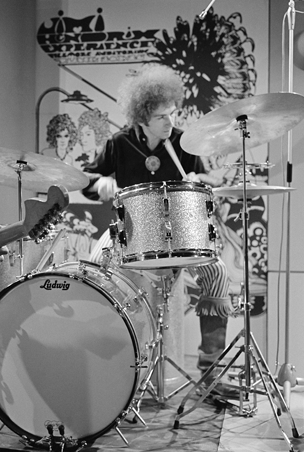
John Graham "Mitch" Mitchell was an English drummer and child actor, who was best known for his work in the Jimi Hendrix Experience for which he was inducted into the Rock and Roll Hall of Fame in 1992. He was inducted into the Modern Drummer Hall of Fame in 2009.

Band of Gypsys is a live album by Jimi Hendrix and the first without his original group, the Jimi Hendrix Experience. It was recorded on January 1, 1970, at the Fillmore East in New York City with Billy Cox on bass and Buddy Miles on drums, frequently referred to as the Band of Gypsys. The album mixes funk and rhythm and blues elements with hard rock and jamming, an approach which later became the basis of funk rock. It contains previously unreleased songs and was the last full-length Hendrix album released before his death.

First Rays of the New Rising Sun is a compilation album credited to American rock musician Jimi Hendrix, issued in April 1997 on MCA Records. Featuring songs mostly intended for his planned fourth studio album, it was one of the first releases overseen by Experience Hendrix, the family company that took over management of his recording legacy. It reached the album charts in the United States, United Kingdom, and four other countries.

Experience Hendrix: The Best of Jimi Hendrix is a compilation album of songs by American rock musician Jimi Hendrix, released in 1997 by MCA and reissued in 2010 by Legacy Recordings. The single compact disc collects 20 songs spanning his career, from his first recordings with the Jimi Hendrix Experience in 1966 to his last with Billy Cox and Mitch Mitchell in 1970.

Blues is a compilation album of blues songs recorded by American singer/songwriter/musician Jimi Hendrix. Compiled by interim Hendrix producer Alan Douglas, it was released April 26, 1994, by MCA Records. The album contains eleven songs recorded by Hendrix between 1966 and 1970, six of which were previously unreleased. Hendrix wrote seven of the pieces; other writers include Muddy Waters, Booker T. Jones, and Elmore James. Most are demos, jams, and live recordings, which Hendrix may or may not have completed for release.
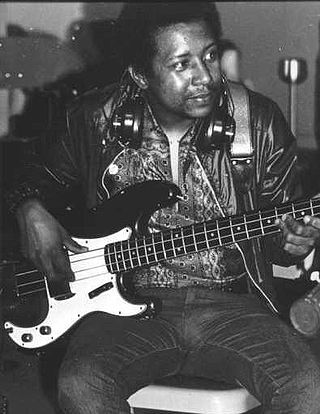
William Cox is an American bassist, best known for performing with Jimi Hendrix. Cox is the only surviving musician to have regularly played with Hendrix: first with the experimental group that backed Hendrix at Woodstock, followed by the trio with drummer Buddy Miles that recorded the live Band of Gypsys album, and, lastly, The Cry of Love Tour trio with Mitch Mitchell back on drums. Cox continues to perform dates with the Band of Gypsys Experience and the Experience Hendrix Tour.

"Machine Gun" is a song written by American musician Jimi Hendrix, and originally recorded for the 1970 Band of Gypsys album, with Billy Cox and Buddy Miles. It is a lengthy, loosely defined (jam-based) protest of the Vietnam War, and perhaps a broader comment on conflict of any kind.

South Saturn Delta is a posthumous compilation album by American rock musician Jimi Hendrix. Released in 1997 by Experience Hendrix, it consists of material such as demo tapes, unfinished takes and alternate mixes, and previously released material, most of which Hendrix had been working on prior to his death in 1970.
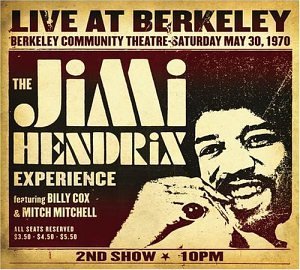
Live at Berkeley is a live album by American rock musician Jimi Hendrix. It documents his second performance at the Berkeley Community Theatre on May 30, 1970, and was released by MCA Records on September 16, 2003.

Nine to the Universe is a posthumous compilation album by American guitarist Jimi Hendrix. It was released in March 1980 in the US and in June 1980 in the UK. It was the third album of Hendrix recordings to be produced by Alan Douglas.

"Freedom" is a rock song by Jimi Hendrix that is often regarded as one of the most fully realized pieces he wrote and recorded in the months before his death. It incorporates several musical styles and the lyrics reflect various situations facing Hendrix at the time.

Rainbow Bridge is a compilation album by American rock musician Jimi Hendrix. It was the second posthumous album release by his official record company and is mostly composed of recordings Hendrix made in 1969 and 1970 after the breakup of the Jimi Hendrix Experience. Despite the cover photo and subtitle Original Motion Picture Sound Track, it does not contain any songs recorded during his concert appearance for the 1971 film Rainbow Bridge.
"Stepping Stone" is a song by American musician Jimi Hendrix. Written and produced by Hendrix, he recorded it early in 1970 with the short-lived Band of Gypsys lineup of Hendrix, Billy Cox and Buddy Miles. The song, with "Izabella", was released as a single by Reprise Records on April 8, 1970. It was the last single released by Hendrix before his death. Other versions are included on posthumous albums.
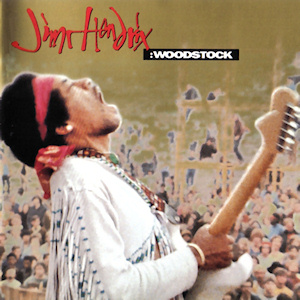
Woodstock is a live album by Jimi Hendrix released posthumously on August 20, 1994. It presents some of Hendrix's performance at Woodstock Festival on August 18, 1969. The album was replaced by a more-complete version in 1999 titled Live at Woodstock, albeit with some of the performers mixed out.

The Cry of Love Tour was a 1970 concert tour by American rock guitarist and singer Jimi Hendrix. It began on April 25, 1970, at the Forum in Inglewood, California, and ended on September 6, 1970, at the Love & Peace Festival in Fehmarn, West Germany. The majority of the 37 shows were in the United States, with two each in Sweden, Denmark, and West Germany, and one in England, where Hendrix was the final act at the Isle of Wight Festival 1970.

"Hear My Train A Comin'" is a blues-based song written by Jimi Hendrix. Lyrically, it was inspired by earlier American spirituals and blues songs which use a train metaphor to represent salvation. Hendrix recorded the song in live, studio, and impromptu settings several times between 1967 and 1970, but never completed it to his satisfaction.

Freedom: Atlanta Pop Festival is a posthumous live album by Jimi Hendrix, released in 2015. It documents his July 4, 1970, performance at the Atlanta International Pop Festival. The festival's audience, subject to a wide range of estimates from 200,000-400,000, was the largest U.S. crowd to which Hendrix played during his career.
"Hey Baby (New Rising Sun)" or simply "Hey Baby" is a song written and recorded by American musician Jimi Hendrix, from his second posthumous album Rainbow Bridge (1971). The song is a slower and more melodic piece, which features the prominent use of chorus- and tremolo-effects on guitar. Hendrix uses an idealized feminine figure that recurs in several of his lyrics. Commentators have seen the song as representative of his post-Band of Gypsys musical direction.
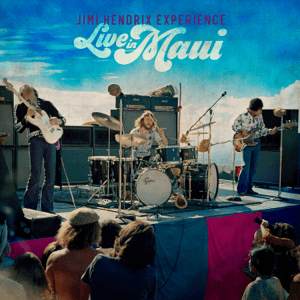
Live in Maui is an album by the Jimi Hendrix Experience documenting their performance outdoors on Maui, Hawaii, on July 30, 1970. It marks the first official release of Hendrix's two full sets recorded during the filming of Rainbow Bridge (1971). The two-CD and three-LP set was released on November 20, 2020, along with a video documentary titled Music, Money, Madness ... Jimi Hendrix in Maui.
















